|
|
|
Sort Order |
|
|
|
Items / Page
|
|
|
|
|
|
|
| Srl | Item |
| 1 |
ID:
153895


|
|
|
|
|
| Summary/Abstract |
The Brazilian-Argentine Agency for Accounting and Control of Nuclear Materials (ABACC) is a unique bilateral nonproliferation regime created by Brazil and Argentina after a long process of negotiations and confidence building. The creation of the agency in July 1991 marked a paradigmatic shift in the Brazilian-Argentine relationship, converting their long rivalry into a profound strategic partnership. This article presents a historical overview of the creation of ABACC and discusses how it paved the way for the integration of Brazil and Argentina into the nonproliferation regime. The article also shows how ABACC tackled nonproliferation challenges in the twenty-first century, helping Brazil and Argentina continue their nuclear programs with fewer risks to the autonomy and development goals traditionally defended in their foreign policies.
|
|
|
|
|
|
|
|
|
|
|
|
|
|
|
|
| 2 |
ID:
135234
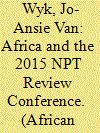

|
|
|
|
|
| Summary/Abstract |
African states' attendance at and participation in the preparations for the 2015 Review Conference of the Parties to the Treaty on the Non-proliferation of Nuclear Weapons (NPT) has produced mixed results, with the continent acting as both agent and bystander in respect of certain issues. African agency is evident in, for example, its position as a member of groupings on Iran's nuclear weapons programme and the Middle East Nuclear Weapons Free Zone. Less agency is evident in states' individual actions. This underscores the importance of African states' preference for multilateralism. However, African agency is also less evident in African multilateral efforts at the NPT preparatory meetings. The impact of these developments on the 2015 NPT Review Conference is too soon to tell but may bode ill for African agency.
|
|
|
|
|
|
|
|
|
|
|
|
|
|
|
|
| 3 |
ID:
166861
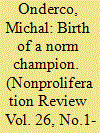

|
|
|
|
|
| Summary/Abstract |
In 1995, South Africa was in a special position. It was: a new party to the Treaty on the Non-Proliferation of Nuclear Weapons (NPT), the first country to voluntarily renounce nuclear weapons, led by a charismatic leader, and seen as a champion of disarmament principles. Yet South Africa’s new leaders were also interested in affirming their position within the Non-Aligned Movement, which was adamantly opposed to the NPT’s indefinite extension. Why, then, did South Africa decide to support the indefinite extension of the NPT in 1995? Existing scholarship has ascribed too much credit to pressure from the United States, overlooking domestic debates in South Africa and the bifurcation between professional diplomats and political elites. This article, building on new archival sources and in-depth oral-history interviews with major actors, demonstrates that South African diplomats opposed indefinite extension while South African policy elites allocated little attention to the topic until late in the game. The findings contribute to our understanding of South Africa’s norm entrepreneurship, as well as the politics of global nonproliferation.
|
|
|
|
|
|
|
|
|
|
|
|
|
|
|
|
| 4 |
ID:
153892
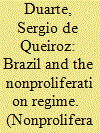

|
|
|
|
|
| Summary/Abstract |
This article addresses the historical relations between Brazil and the international nonproliferation regime. It also discusses the current position of the Brazilian government regarding the Additional Protocol and the Treaty on the Non-Proliferation of Nuclear Weapons, as well as some aspects of the Brazilian nuclear program.
|
|
|
|
|
|
|
|
|
|
|
|
|
|
|
|
| 5 |
ID:
153893


|
|
|
|
|
| Summary/Abstract |
Focusing on the tenure of the Workers' Party (2003–16), we appraise the tensions between the Brazilian government and international nuclear governance mechanisms after the end of the Cold War. We examine three main dimensions of Brazilian nuclear policy: the search for autonomy and the affirmation of sovereignty, the economic-development rationale, and the security aspect. We present an interpretation of Brazilian nuclear policy within its broader cultural setting and the framing of foreign policy and international relations as defined by the ruling elite.
|
|
|
|
|
|
|
|
|
|
|
|
|
|
|
|
| 6 |
ID:
143304
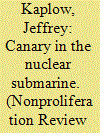

|
|
|
|
|
| Summary/Abstract |
The Treaty on the Non-Proliferation of Nuclear Weapons (NPT) allows states to exempt nuclear material from international safeguards for use in nuclear submarine programs. This material, however, could be diverted for nuclear weapons purposes without the knowledge of inspectors, creating a potentially dangerous loophole in the treaty. This article argues that exercising that loophole today would amount to admitting a nuclear weapon program, making it a particularly poor pathway to a weapon for a potential proliferant. Still, if states like Brazil ultimately exempt nuclear material from safeguards for a nuclear submarine effort, they could set a dangerous precedent that makes it easier for others to use the loophole as a route to a nuclear weapon capability. There are several policy options available to mitigate the damage of such a precedent; most promising is the prospect of a voluntary safeguards arrangement that would allow international inspectors to keep an eye on nuclear material even after it has been dedicated to a naval nuclear propulsion program.
|
|
|
|
|
|
|
|
|
|
|
|
|
|
|
|
| 7 |
ID:
144289
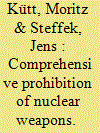

|
|
|
|
|
| Summary/Abstract |
There have been calls for the abolition of nuclear weapons from the day they were invented. Over the last fifteen years, some indications can be found that such calls have been getting louder, among them Barack Obama's famous 2009 speech in Prague. In this article, we investigate if support for a comprehensive norm that would prohibit development, possession, and use of nuclear weapons is really growing. To assess the current status of that norm, we use the model of a “norm life cycle,” developed by Martha Finnemore and Kathryn Sikkink. We then analyze 6,545 diplomatic statements from the review process of the Treaty on the Non-Proliferation of Nuclear Weapons as well as from the UN General Assembly First Committee on Disarmament and International Security, covering the years 2000 to 2013. The evidence shows that a comprehensive prohibition can be considered an emerging international norm that finds growing support among states without nuclear weapons and nuclear weapon states alike. Only a core group of states invoke the norm consistently, however. This leads us to conclude that the “tipping point” of the life cycle, at which adherence to a new norm starts to spread rapidly, has yet to be reached.
|
|
|
|
|
|
|
|
|
|
|
|
|
|
|
|
| 8 |
ID:
079623
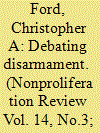

|
|
|
|
|
| Publication |
2007.
|
| Summary/Abstract |
The author offers a close analysis of Article VI of the Treaty on the Non-Proliferation of Nuclear Weapons (NPT), the treaty's only article dealing with disarmament, focusing upon both its text and negotiating history, and assesses its applicability as a standard for judging treaty compliance. The author critiques comments on Article VI made by the International Court of Justice in a 1996 case as legally ill founded and conceptually incoherent as a compliance yardstick. The only interpretation of Article VI consistent with its text and history, the author argues, is that it - as it says - merely requires all states to pursue negotiations in good faith; specific disarmament steps are not required. Claims that the 2000 NPT Review Conference imposed new legal obligations for disarmament or altered the meaning of Article VI are found to be mistaken; although the conference could theoretically have adopted interpretive criteria for understanding the meaning of Article VI, it did not in fact do so. Applying his Article VI compliance standard to the case of U.S. compliance, and comparing modern circumstances with those during the Cold War, the author also describes what he says is an excellent U.S. record of Article VI compliance
|
|
|
|
|
|
|
|
|
|
|
|
|
|
|
|
| 9 |
ID:
089069


|
|
|
|
|
| Publication |
2009.
|
| Summary/Abstract |
How do we assess the health of international regimes? Many analysts have insisted recently that the nuclear nonproliferation regime is in urgent need of repair or that it should even be discarded because of its supposed ineffectiveness. However, it is essential that statements about the regime being in crisis be scrutinized for veracity and utility. While the spread of nuclear weapons poses an undeniable and serious threat to international security, a mistaken crisis mentality with respect to the regime could lead to rash attempts to alter it in unnecessary or ineffective ways or, at worst, to discard it completely. This paper returns to a theoretical framework that differentiates regimes, across both issue areas and time, to provide a more specified evaluation of regime health. By disaggregating the nuclear nonproliferation regime and assessing the individual and interactive health of multiple dimensions, a number of dimension-specific, regime-strengthening policy recommendations emerge.
|
|
|
|
|
|
|
|
|
|
|
|
|
|
|
|
| 10 |
ID:
147682


|
|
|
|
|
| Summary/Abstract |
South Africa had active nuclear, biological, and chemical weapons programs during the 1970s and 1980s. South Africa dismantled its nuclear weapon program prior to its 1991 accession to the Treaty on the Non-Proliferation of Nuclear Weapons (NPT). Similarly, it terminated its chemical weapons program prior to its 1995 ratification of the Chemical Weapons Convention. Only the dismantlement of Pretoria's nuclear weapons program was subjected to international verification—albeit ex post facto—following a 1993 decision of the International Atomic Energy Agency (IAEA) General Conference to verify the correctness and completeness of South Africa's declarations under its NPT safeguards agreement. During the 1980s, South Africa also developed and purportedly used biological weapons, violating its obligations under the 1972 Convention on the Prohibition of the Development, Production, and Stockpiling of Bacteriological (Biological) and Toxin Weapons and on their Destruction, which it had ratified in 1975. This article draws lessons from the verification of the dismantlement of these programs and makes recommendations for future verification work to confirm the elimination of weapons of mass destruction capabilities.
|
|
|
|
|
|
|
|
|
|
|
|
|
|
|
|
| 11 |
ID:
111131
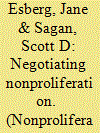

|
|
|
|
|
| Publication |
2012.
|
| Summary/Abstract |
In nuclear nonproliferation negotiations, many governments pursue multiple objectives, and changes in policy can occur rapidly-and often unexpectedly. For these reasons, understanding nonproliferation requires empathy and imagination rather than just historical fact. This article considers one teaching tool to encourage such insight-simulations-and demonstrates how teaching and scholarship can interact to improve our understanding of the complex decisions and negotiations involved in nuclear nonproliferation. The article consists of five parts: first, it explains the benefits of simulations as both a policy development tool in Washington and as a teaching tool in universities; second, it describes the pedagogical strategy of the Stanford University simulation program; third, it shows how the simulations have identified and highlighted theoretical and substantive insights that are often neglected in scholarly studies of nonproliferation; and fourth, it describes how students are tested to enhance the learning experience from the simulation. Fifth and finally, the article provides concluding observations about how using simulations in the classroom can help scholars develop insights that improve their understanding of real-world nuclear negotiation dynamics and outcomes.
|
|
|
|
|
|
|
|
|
|
|
|
|
|
|
|
| 12 |
ID:
160982
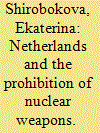

|
|
|
|
|
| Summary/Abstract |
On July 7, 2017, the United Nations conference to negotiate a legally binding instrument to prohibit nuclear weapons concluded with the adoption of the Treaty on the Prohibition of Nuclear Weapons (TPNW), which opened for signatures at the United Nations General Assembly two months later, on September 20. The nuclear-weapon states and their allies boycotted the negotiations with the sole exception of the Netherlands, which not only is a member of NATO, but also hosts US nuclear weapons on its territory. Domestic pressure and political traditions had significant effects on the Dutch government’s decision to participate in the ban negotiations. The Netherlands negotiated in good faith, but its multilateralism and humanitarian considerations could not tip the scales in favor of joining the ban treaty. The government’s commitment to a “step–by–step” approach to nuclear disarmament and maintenance of close cooperation with NATO determined the Dutch position on the new instrument. Despite staying outside the TPNW, the Dutch government shares the goal of nuclear-weapons elimination. This article also suggests a number of actions the Netherlands could take to advance nuclear disarmament.
|
|
|
|
|
|
|
|
|
|
|
|
|
|
|
|
| 13 |
ID:
089068
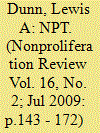

|
|
|
|
|
| Publication |
2009.
|
| Summary/Abstract |
This article assesses the successes and failures of the Treaty on the Non-Proliferation of Nuclear Weapons (NPT) since its creation in 1968 by developing and applying a set of "metrics" to each of the NPT's substantive articles as well as to its withdrawal provisions. In light of this analysis, the article also puts forward some specific proposals for strengthening the NPT and its implementation, with a view to the debate and decisions at the upcoming 2010 NPT Review Conference. A concluding section turns explicitly to the 2010 NPT Review Conference and proposes pursuit of agreement on three NPT Action Plans: one for nonproliferation, one for peaceful uses, and one for nuclear disarmament. Combining vision and practicable steps, these Action Plans would set out a roadmap for action between the 2010 and the 2015 NPT Review Conferences. They could provide a foundation for substantive exchanges-in this case, on progress toward their implementation-during the preparations for the 2015 conference.
|
|
|
|
|
|
|
|
|
|
|
|
|
|
|
|
| 14 |
ID:
076723
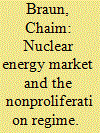

|
|
|
|
|
| Publication |
2006.
|
| Summary/Abstract |
This article presents a review of the sensitivities to proliferation attempts in each of the different stages of the commercial nuclear fuel cycle and within the nuclear power industry. As the global nuclear power industry may be on the brink of a major expansion that might rival its original growth at the inception of the nuclear age, the question is: Would this second expansion create uncontrollable proliferation risks in its wake? The basic answer is that the nuclear power industry in itself does not pose a direct proliferation threat; however, various elements of the nuclear fuel cycle could create different proliferation sensitivities if not safeguarded carefully. The first element of securing the nuclear fuel cycle is the understanding of which elements pose the greatest potential for successful proliferation attempts. These issues and several institutional and technical mitigation strategies to reduce the potential for possible proliferation are discussed here.
|
|
|
|
|
|
|
|
|
|
|
|
|
|
|
|
| 15 |
ID:
160985
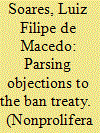

|
|
|
|
|
| Summary/Abstract |
The Secretary-General of the Agency for the Prohibition of Nuclear Weapons in Latin America and the Caribbean (OPANAL) rejects the argument of those opposed to the 2017 Treaty on the Prohibition of Nuclear Weapons that the treaty undermines the 1968 Treaty on the Non-Proliferation of Nuclear Weapons. This viewpoint is based upon Ambassador Soares’s statement to the conference, “Regional Consultations on the NPT: Towards the 2018 PrepCom,” held in Mexico City, February 15, 2018.
|
|
|
|
|
|
|
|
|
|
|
|
|
|
|
|
| 16 |
ID:
152068
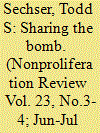

|
|
|
|
|
| Summary/Abstract |
What are the political and strategic consequences of nuclear deployments overseas? The United States continues to maintain around 200 nuclear warheads in Europe, and some observers have called for the United States to redeploy tactical nuclear weapons to the Korean peninsula. This article reviews the insights from recent research on the effects of foreign-deployed nuclear weapons. It asks two central questions. First, does the evidence support the view that foreign nuclear deployments contribute to deterrence? Second, do these deployments strengthen or undermine the Treaty on the Non-Proliferation of Nuclear Weapons? The evidence suggests that foreign nuclear deployments contribute less to deterrence than previously believed. Further, nuclear deployments probably have mixed effects on proliferation. Unanswered questions for further research include the extent to which nuclear-sharing arrangements reassure allies, and the political and strategic consequences of canceling them.
|
|
|
|
|
|
|
|
|
|
|
|
|
|
|
|
| 17 |
ID:
142650
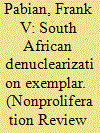

|
|
|
|
|
| Summary/Abstract |
South Africa's nuclear disarmament is a unique historical case, notable in part for the dramatic shift from deception to cooperation. The unprecedented transparency it demonstrated in order to convince the international community of the veracity of their disarmament is heralded as an exemplar for verifiable denuclearization. Less known is how this case affords insights into how a nuclear weapon program can be clandestinely hidden by the ambiguity provided by an otherwise completely legitimate, peaceful, nuclear energy program. Using a variety of open sources, including newly declassified internal South African and US government reports, it can be shown that South Africa employed a variety of deceptive tactics before it disarmed, and even for nearly two years after becoming a signatory to the Treaty on the Non-Proliferation of Nuclear Weapons. This article reviews that information to derive instructive lessons on the lengths that a nuclear proliferant state might go to conceal its true capabilities and intentions, and to thwart international discovery of the existence and full extent of an existing—or, in this case, a former—nuclear weapon program.
|
|
|
|
|
|
|
|
|
|
|
|
|
|
|
|
| 18 |
ID:
166860
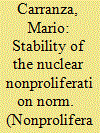

|
|
|
|
|
| Summary/Abstract |
This article argues that the nuclear nonproliferation norm (NNPN) is a social fact with a relatively independent life of its own and that it has a powerful impact on the behavior of both nuclear-weapon states (NWS) and non-nuclear-weapon states (NNWS). It challenges the application of critical constructivist research on norms to the NNPN and the idea that its legitimacy and structural power depend on contestation “all the way down.” State and non-state actors play an important role in explaining the dynamics of the NNPN, but agential constructivism runs the danger of “throwing the baby out with the bath water,” neglecting the structural impact of the NNPN on state behavior. The article examines the limitations of norm-contestation theory, arguing that some norms are more resistant to contestation than others. The NNPN is more difficult to contest than new norms (such as the Responsibility to Protect) because it is rooted in fifty years of nonproliferation nuclear diplomacy. The US-India nuclear deal is not a case of “norm change” but a violation of the NNPN. The “core” of the NNPN has not changed since the US-India nuclear deal. The conflict confronting NWS and NNWS is about the implementation of “type 2” norms (organizing principles) and “type 3” norms (standardized procedures), and not about the “hard core” of the NNPN.
|
|
|
|
|
|
|
|
|
|
|
|
|
|
|
|
| 19 |
ID:
144290
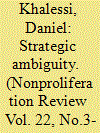

|
|
|
|
|
| Summary/Abstract |
Since the 1950s, the United States has engaged in nuclear sharing with its NATO allies. Today, 150-200 tactical nuclear weapons remain on European soil. However, the Treaty on the Non-proliferation of Nuclear Weapons (NPT) prohibits the transfer of nuclear weapons to non-nuclear weapon states. The potential discrepancy between text and practice raises the question of how the NPT's negotiators dealt with NATO's nuclear-sharing arrangements while drafting the treaty that would eventually become the bedrock of the international nonproliferation regime. Using a multitiered analysis of secret negotiations within the White House National Security Council, NATO, and US-Soviet bilateral meetings, this article finds that NATO's nuclear-sharing arrangements strengthened the NPT in the short term by lowering West German incentives to build the bomb. However, this article also finds that decision makers and negotiators in the Lyndon B. Johnson administration had a coordinated strategy of deliberately inserting ambiguous language into drafts of Articles I and II of the Treaty to protect and preserve NATO's pre-existing nuclear-sharing arrangements in Europe. This diplomatic approach by the Johnson administration offers lessons for challenges concerning NATO and relations with Russia today.
|
|
|
|
|
|
|
|
|
|
|
|
|
|
|
|
| 20 |
ID:
140982
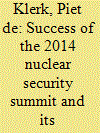

|
|
|
|
|
| Summary/Abstract |
The 2014 Nuclear Security Summit (NSS) in The Hague was a resounding success, both in organizational terms and in terms of substance. The new substance can be found in the Communiqué, as well as in innovative joint statements by participants, all of which may be considered as implementation of actions decided upon in the Final Document of the 2010 Review Conference of the Treaty on the Non-Proliferation of Nuclear Weapons. The next two years in the NSS process cannot be business as usual. This viewpoint makes some suggestions for NSS states to undertake between now and the final summit in 2016, including preparations for winding down the NSS process as we know it.
|
|
|
|
|
|
|
|
|
|
|
|
|
|
|
|
|
|
|
|
|